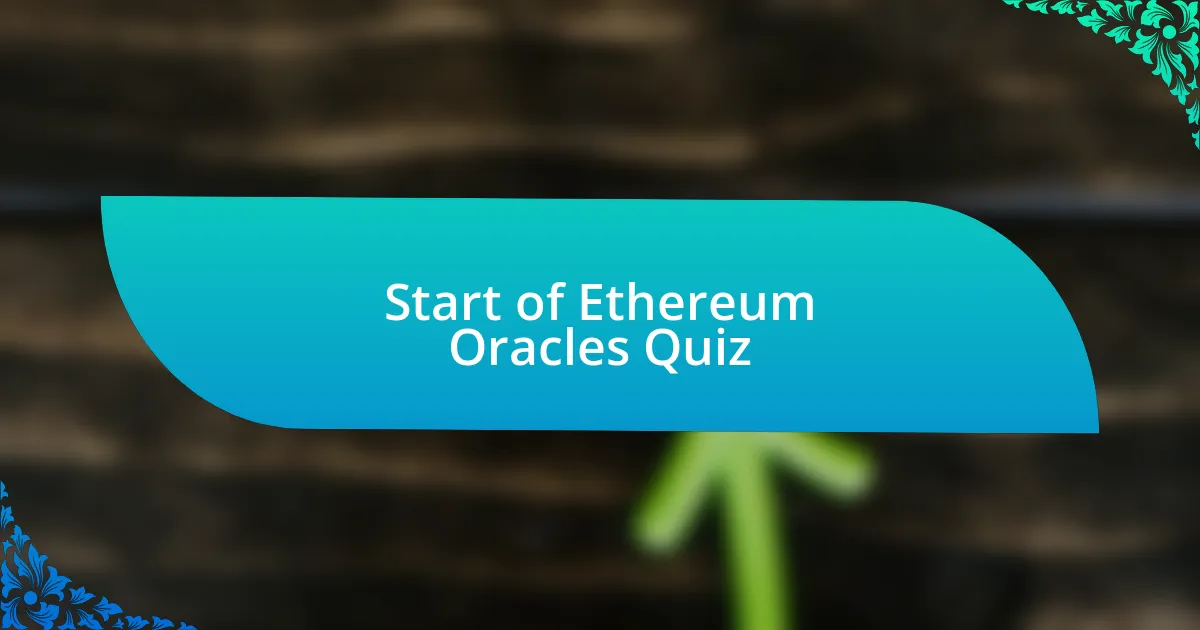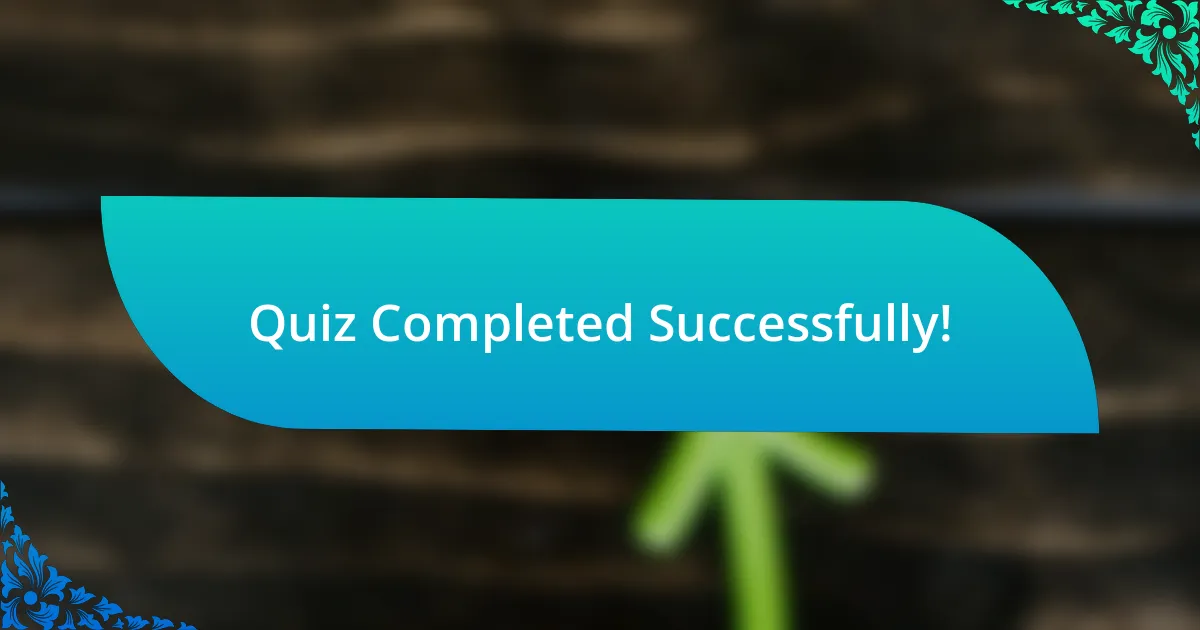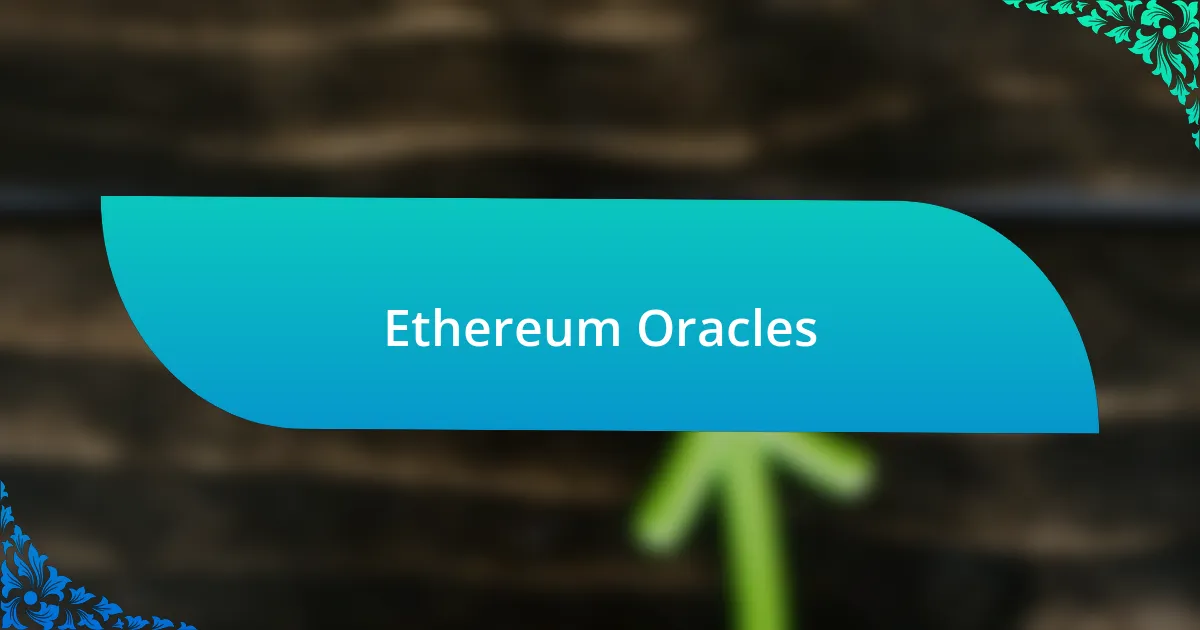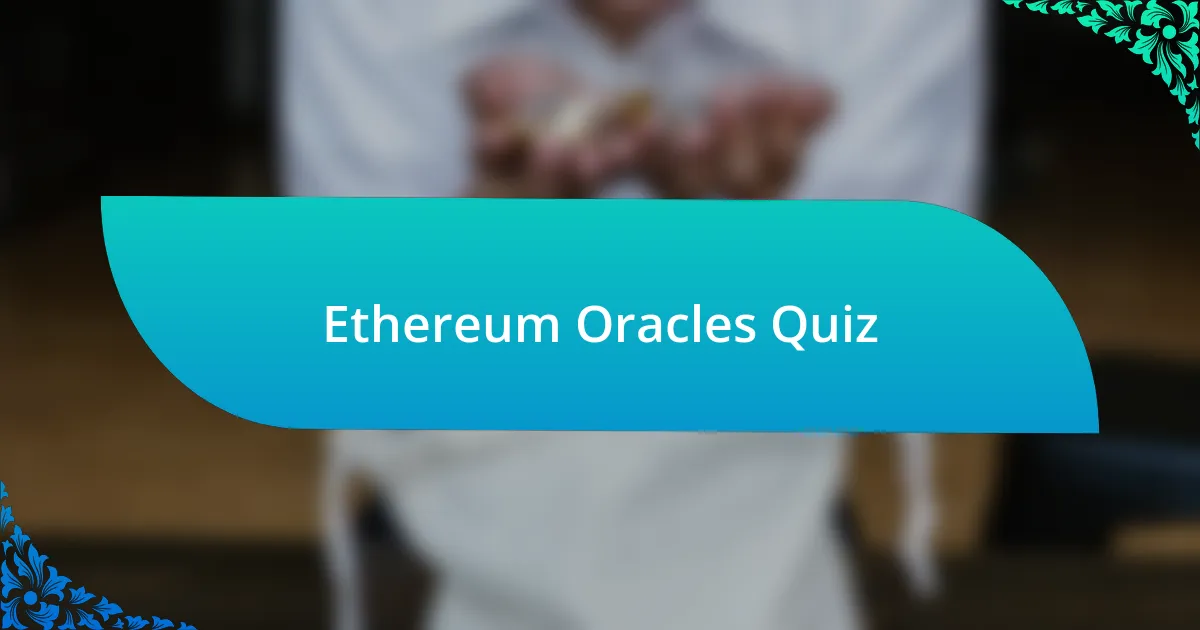
Start of Ethereum Oracles Quiz
1. What is an Ethereum oracle?
- An Ethereum oracle provides smart contracts with access to real-world data.
- An Ethereum oracle creates new tokens on the Ethereum network.
- An Ethereum oracle is a type of digital currency.
- An Ethereum oracle validates transactions on the blockchain.
2. Why do Ethereum smart contracts need oracles?
- Ethereum smart contracts need oracles to create new cryptocurrencies on the network.
- Ethereum smart contracts need oracles to encrypt data before deployment.
- Ethereum smart contracts need oracles to function faster without gas fees.
- Ethereum smart contracts need oracles because they cannot access external data directly.
3. What are the types of oracles used in Ethereum?
- Software oracles
- Static oracles
- Inactive oracles
- Average oracles
4. What function do software oracles serve in Ethereum?
- Software oracles manage the security protocols of the Ethereum network.
- Software oracles convert physical events into digital signals for contracts.
- Software oracles communicate with external data providers and add their findings to the distributed ledger.
- Software oracles perform financial transactions on behalf of users automatically.
5. How do hardware oracles differ from software oracles?
- Hardware oracles provide software for data management.
- Hardware oracles transmit data over wireless networks.
- Hardware oracles convert physical occurrences into machine-readable values.
- Hardware oracles are designed for security audits only.
6. What is the distinction between inbound and outbound oracles?
- Inbound oracles send data out, while outbound oracles bring data in.
- Inbound oracles bring data into smart contracts, while outbound oracles send data out.
- Inbound oracles analyze data, while outbound oracles format data for storage.
- Inbound oracles store data, while outbound oracles transmit data to users.
7. What are the primary functions of compute-enabled oracles?
- Validate transactions using only on-chain data sources.
- Provide decentralized services that are impractical to conduct on-chain.
- Store and encrypt all data within the blockchain environment.
- Replace smart contracts with off-chain solutions entirely.
8. How do consensus-based oracles operate to ensure data accuracy?
- Consensus-based oracles use multiple oracles and a consensus algorithm to derive factual data, ensuring accuracy and trustworthiness.
- Consensus-based oracles require manual verification of all data inputs before use.
- Consensus-based oracles ignore discrepancies among data sources, leading to potential inaccuracies.
- Consensus-based oracles rely on a single source of data to guarantee accuracy.
9. What is the significance of data accuracy in oracle operations?
- Oracles automatically generate smart contracts without input.
- Oracles act as storage for cryptocurrency wallets and keys.
- Oracles create new cryptocurrencies for transactions and exchanges.
- Oracles ensure that data passed to the blockchain is accurate and trustworthy.
10. How can oracles obtain data from non-blockchain sources?
- Oracles derive data from any non-blockchain source and send it on-chain leveraging signed messages.
- Oracles acquire data from internal databases without any external input.
- Oracles only extract data from the blockchain and do not interact with external sources.
- Oracles create data manually and write it directly to the blockchain.
11. What mechanisms do oracles use to store data in smart contracts?
- Oracles transmit the data to external servers.
- Oracles delete the data from the blockchain.
- Oracles store the data in a smart contract.
- Oracles encrypt the data to secure it off-chain.
12. Why is gas important in the context of Ethereum oracles?
- Gas handles the security of smart contracts on Ethereum.
- Gas guarantees the accuracy of data provided by oracles.
- Gas measures the amount of computational effort required to execute transactions.
- Gas stores cryptocurrency for transactions on Ethereum.
13. What role do Chainlink Price Feeds play in Ethereum oracles?
- Chainlink Price Feeds create off-chain databases for storing historical prices.
- Chainlink Price Feeds maintain the security of smart contracts by encrypting data.
- Chainlink Price Feeds provide DeFi smart contracts with on-chain access to financial market data.
- Chainlink Price Feeds are used to automate the mining process of new tokens.
14. How do input and output oracles differ in functionality?
- Input oracles fetch data from the real world, while output oracles send commands to off-chain systems.
- Input oracles send commands to off-chain systems, while output oracles fetch data from the real world.
- Input oracles trigger actions based on blockchain events, while output oracles simply log information.
- Input oracles store data in smart contracts, while output oracles retrieve it from the blockchain.
15. What is the purpose of cross-chain oracles in Ethereum?
- Cross-chain oracles provide security to Ethereum transactions.
- Cross-chain oracles facilitate interoperability between different blockchains.
- Cross-chain oracles are used for mining new Ethereum tokens.
- Cross-chain oracles limit interactions to a single blockchain network.
16. In what way do compute-enabled oracles leverage off-chain computation?
- They store all data exclusively on-chain.
- They only validate data received from other oracles.
- They send data directly to hardware oracles.
- They perform tasks that cannot be done on-chain.
17. What is the responsibility of the consensus algorithm in oracle systems?
- Store data in smart contracts
- Execute smart contracts directly
- Connect to external devices
- Ensure data accuracy in blockchain
18. How do oracles ensure that data they provide is trustworthy?
- They rely on a single source for data integrity.
- They provide data without any authentication methods.
- They use consensus algorithms to verify data.
- They ignore data verification processes completely.
19. What does quorum represent in the context of consensus-based oracles?
- Quorum ensures a minimum number of oracles must agree before data is valid.
- Quorum is the total data size allowed in smart contracts.
- Quorum represents the maximum limit of oracles in a network.
- Quorum is the number of nodes required for data encryption.
20. How is the data managed by oracles in smart contracts?
- Oracles delete the data upon retrieval from sources.
- Oracles only keep data temporarily for immediate processing.
- Oracles store the data in a smart contract for access.
- Oracles encrypt the data and distribute it across networks.
21. What initiates an event that an oracle must detect outside the blockchain?
- Validate a blockchain entry
- Trigger an event outside the blockchain
- Execute a smart contract
- Create a transaction on the blockchain
22. In what manner do inbound oracles function within Ethereum?
- Inbound oracles send commands to off-chain systems for execution.
- Inbound oracles bring information from the outside world into smart contracts.
- Inbound oracles conduct transactions between multiple blockchains.
- Inbound oracles validate data exclusively on the blockchain.
23. How do outbound oracles interact with external systems?
- Outbound oracles fetch data from on-chain sources for validation.
- Outbound oracles send commands to off-chain systems to trigger specific actions.
- Outbound oracles facilitate communication between smart contracts and databases.
- Outbound oracles collect information from users to update the blockchain.
24. Why is secure off-chain computation vital for some oracles?
- It allows decentralized services that are impractical to conduct on-chain.
- It increases the transaction fees associated with contracts.
- It simplifies the design of on-chain smart contracts.
- It maximizes on-chain storage capabilities.
25. How do consensus-based oracles derive factual data?
- Random data selection
- Manual data entry
- Single source of data
- Consensus algorithm from multiple oracles
26. What unique services does Chainlink offer in the realm of oracles?
- Chainlink exclusively delivers print media for financial data.
- Chainlink only provides on-chain data storage solutions.
- Chainlink offers input and output oracles for DeFi smart contracts integration.
- Chainlink supplies internet hosting services for oracles.
27. What capabilities do oracles have to derive and store external data?
- Oracles derive data exclusively from blockchain sources and rely on existing contracts.
- Oracles derive data from non-blockchain sources and store it in smart contracts.
- Oracles can only store data temporarily without any permanent access.
- Oracles only fetch data from other oracles and do not store anything.
28. How do oracles compile data from various online sources?
- Oracles create data from blockchain nodes and store it on offline databases.
- Oracles assemble data from any online source, including servers and web pages, and add their findings to the distributed ledger.
- Oracles transform data from smart contracts into external files and share them via email.
- Oracles delete irrelevant information from blockchain histories to improve performance.
29. What types of real-time data can software oracles provide?
- Weather patterns
- Personal user data
- Currency exchange rates
- Historical news articles
30. What tools do hardware oracles use to obtain real-world data?
- Electronic sensors
- Email communications
- Social media posts
- Blockchain transactions

Quiz Completed Successfully!
Congratulations on completing the quiz on Ethereum Oracles! This has been an engaging journey through a crucial aspect of the blockchain ecosystem. You’ve explored how oracles bridge the gap between smart contracts and real-world data. Understanding this connection is vital for anyone interested in decentralized finance and blockchain applications.
Throughout the quiz, you likely learned about different types of oracles, how they function, and their importance in enhancing the reliability of smart contracts. You may also have gained insights into their applications in various industries, including finance, insurance, and supply chains. Each question was designed to challenge your understanding and deepen your knowledge of this fascinating topic.
We encourage you to check out the next section on this page, where you can find more detailed information about Ethereum Oracles. This material will expand on the concepts you’ve just covered and help reinforce your learning. Dive deeper into the world of oracles and enhance your understanding of their role in the blockchain ecosystem!

Ethereum Oracles
Understanding Ethereum Oracles
Ethereum oracles serve as intermediaries between smart contracts and external data sources. They provide vital information that smart contracts need to execute actions based on real-world events. Oracles can access data unavailable on the blockchain, such as prices, weather conditions, and sports scores. They help bridges between blockchain ecosystems and off-chain data, ensuring that smart contracts can operate in the dynamic real world.
Types of Ethereum Oracles
There are primarily three types of Ethereum oracles: centralized, decentralized, and inbound oracles. Centralized oracles originate from a single source and can pose trust risks. Decentralized oracles, such as Chainlink, aggregate data from multiple sources to enhance reliability and reduce the risk of manipulation. Inbound oracles provide data to smart contracts, while outbound oracles send data from the blockchain to the outside world. Each type plays a specific role in the functionality of decentralized applications.
How Ethereum Oracles Work
Ethereum oracles operate by retrieving external data and submitting it to smart contracts on the Ethereum network. They function through off-chain data providers which respond to queries from smart contracts. The oracle fetches relevant information and verifies its accuracy before transmitting it back to the blockchain. This process ensures that smart contracts can act on reliable and up-to-date information, enabling more complex functionalities in decentralized applications.
Use Cases of Ethereum Oracles
Ethereum oracles have diverse use cases across various sectors. They are fundamental in decentralized finance (DeFi) for price feeds, allowing financial applications to react to market changes. They are also used in gaming to provide random number generation and in insurance for real-time claims verification. Each use case leverages the ability of oracles to integrate off-chain information seamlessly into decentralized applications.
Challenges and Limitations of Ethereum Oracles
Despite their advantages, Ethereum oracles face several challenges. Centralized oracles pose trust issues, as they rely on a single point of failure. Additionally, the accuracy and reliability of data from oracles can vary, leading to inconsistencies in smart contract execution. The latency in data transmission and potential vulnerabilities to manipulation also present significant concerns. Addressing these challenges is crucial for improving the efficacy of Ethereum oracles in the blockchain ecosystem.
What are Ethereum Oracles?
Ethereum Oracles are third-party services that provide smart contracts with external data. They enable the blockchain to interact with real-world information. For example, they can deliver price feeds, weather data, or sports results. This functionality is crucial because smart contracts cannot access outside data on their own. By using oracles, Ethereum can execute contracts based on real-time events.
How do Ethereum Oracles work?
Ethereum Oracles work by fetching data from external sources and delivering it to the blockchain. They typically use a network of data providers to ensure accuracy and reliability. When a smart contract requests data, the oracle retrieves it, verifies its authenticity, and submits it to the contract. This mechanism allows decentralized applications to function with real-world inputs.
Where are Ethereum Oracles used?
Ethereum Oracles are used in various decentralized applications across finance, insurance, and gaming. They play a crucial role in decentralized finance (DeFi) platforms for obtaining asset prices. Additionally, they are used in insurance products which require real-world data to trigger payouts. Their versatility allows them to support a broad range of use cases beyond just finance.
When were Ethereum Oracles introduced?
Ethereum Oracles were introduced in the early stages of Ethereum’s development, around 2015. Since then, their importance has grown as decentralized applications have evolved. Notably, projects like Chainlink, founded in 2017, have brought significant attention to the concept of oracles. The demand for reliable data in DeFi and other sectors has accelerated the development and adoption of oracles.
Who created Ethereum Oracles?
Ethereum Oracles were conceptualized by the Ethereum development community. However, Chainlink is one of the most recognized projects to focus on this technology. Founded by Sergey Nazarov and Steve Ellis, Chainlink aims to provide secure and reliable oracles for smart contracts. Their work has significantly influenced how oracles are implemented within the Ethereum ecosystem.

